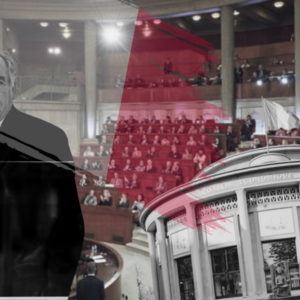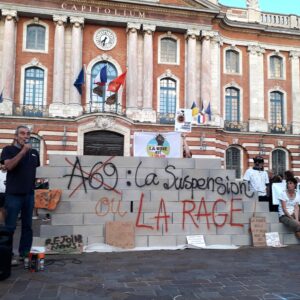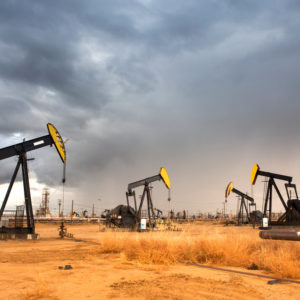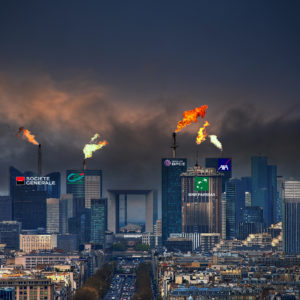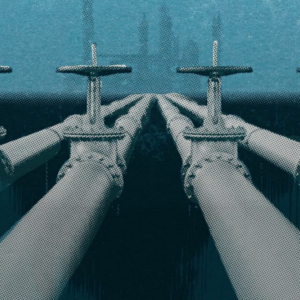
Fossil gas: Friends of the Earth France deciphers how industry and the French state are manufacturing addiction
The report "Fossil gas: manufacturing addiction How the fossil fuel industry and the French State are locking us into an unsustainable energy model", published today by Friends of the Earth France with the support of five organizations, deciphers the mechanisms and actors behind the factory of fossil gas dependency.
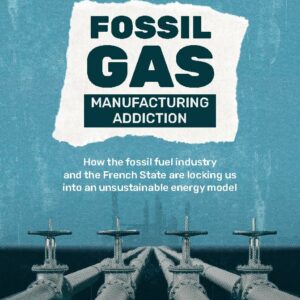
Fossil gas: Manufacturing addiction. How the fossil fuel industry and the French State are locking us into an unsustainable energy model
Past political choices, influenced by the gas industry, have kept France dependent on this energy despite its climate impact and its known high price volatility. Worse still, France has become an essential part in the Russian gas market by transshipping 1 it. This allows Russia to export more gas, finances the war on Ukraine, and has nothing to do with providing French energy security. It is still time to refuse to be locked into this deleterious dependence on outdated fossil energy and transition towards a sustainable energy system. Friends of the Earth France has formulated seventeen recommendations to be implemented as quickly as possible to change course. Five organizations support this report 2.
In February 2022, in his Belfort speech, Emmanuel Macron set the ambition of « making France, within 30 years, the first major country in the world to move away from dependence on fossil fuels » 3. On the European scene, while France vocally declares itself in favor of a move away from fossil fuels, in practice it repeatedly and decisively supports the gas and nuclear industries, while blocking EU ambitions on renewable energies.
France is the third largest consumer of fossil gas and the largest importer of dirty expensive LNG (liquefied natural gas) in the European Union. Yet, France has not implemented the policies needed to significantly reduce its gas consumption. On the contrary, past energy policies, current energy companies greenwashing strategy and government discourse backwardly present it as a bridge fuel.
In 2022, following the Russian invasion of Ukraine, this misleading narrative was coupled with a new myth: LNG would make it possible to do without Russian gas and would therefore be key to ensuring energy independence, thus justifying the explosion in imports in France (+80%). However, the reality is quite different. On the one hand, the French government, companies and banks had been involved for years in developing climate damaging LNG imports, which had already exploded in growth in 2018-2019. On the other hand, LNG imports from Russia increased in 2022 and remained high in 2023. In addition, the Montoir de Bretagne terminal provides a key service for the Russian gas trade that has nothing to do with the security of supply: the transhipment of gas from icebreakers (using the Northern Sea Route) to conventional LNG tankers (that export it elsewhere in the world), enables greater rotation of the icebreakers.
« It is extremely disappointing to see France contributing to the Russian war economy by supporting their LNG industry. 4 The Kremlin continues to use fossil fuel exports to fund its war chest and inflict more pain and suffering on innocent people in Ukraine, as we’ve seen this past week with horrific rocket attacks. »
He goes on: « France must help to end the bloodshed in Ukraine by immediately cutting all support for Russia and its fossil fuel-driven war economy. »
The war in Ukraine and the objective to wean Europe from Russian gas have also been instrumentalized by the gas industry to justify dozens of projects increasing LNG import capacity across Europe, locking in energy systems for years to come. In France, in addition to the floating terminal at Le Havre commissioned in October 2023, six projects have quietly emerged. They could increase France’s LNG import capacity by 75% compared with 2021. Yet here again, the reality shows the absurdity of these projects supported by GRTGaz: current capacity is sufficient to cover our fossil gas consumption, and demand is falling.
« These phenomena at work since 2022 echo other manipulations of recent years by the gas industry. They highlight that dependence on fossil gas is not inevitable, but manufactured. It is the result of political choices, influenced by the interests of the fossil fuel industry ».
The report “Fossil gas: manufacturing addiction” analyzes all the ways in which France has supported fossil gas, from a flawed energy policy to the protean support for companies and banks developing gas projects abroad (in Russia, Mozambique, the United States). With important energy policy texts coming up in 2024, the French State must change course and play a proactive role in planning and implementing a coherent, democratic and fair policy for phasing out fossil gas.
Transhipment: the transfer of LNG from one vessel to another without regasification. Transhipment is therefore different from re-export, where the LNG is regasified, stored in terminals, then re-liquefied and exported. Transhipped gas is not included in the flows transiting through France, unlike gas that is imported and then re-exported.
This report is supported by :
– Beyond Fossil Fuels
– Food and water action Europe
– Razom We Stand
– Reclaim Finance
– Réseau Action Climat
Emmanuel Macron’s declaration, “Taking control of our energy destiny”, February 2022.
Since its war began on February 24, 2022, Russia has amassed more than $600 billion in profits from fossil fuel exports, with some of this money coming from France. If French collaboration with Russian fossil fuels is ended, and international sanctions on Russia’s fossil fuel industry are strengthened and rigorously enforced, the International Energy Agency projects that the Kremlin’s profits from oil and gas could plummet by 40 to 50% by 2030.






